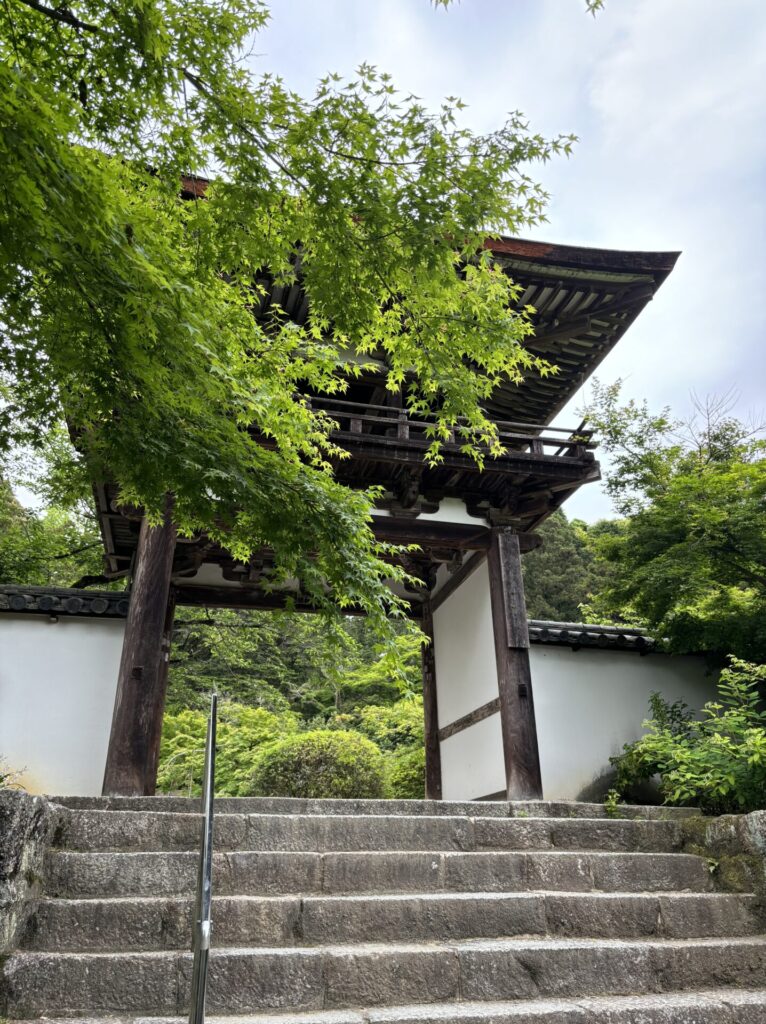
多方面の才能を発揮し、死後は神として敬われた日本人として、梅原猛は聖徳太子と空海を挙げています。
Takeshi Umehara cites Prince Shotoku and Kōbō Daishi Kukai (Kōbō, the founder of Shingon Buddhism) as examples of Japanese figures who displayed multifaceted talents and were revered as deities after their death.
空海は、この世の真実とは何かを追求し、後世の日本人の心にも生活にも大きな影響を与えた人です。
Kōbō Daishi (Kūkai) was a person who pursued the truth of this world and had a profound influence on the hearts and lives of future generations of Japanese people.
空海の教えは、次のようなものです。人生が苦しく迷うのは、表面的できらびやかな感覚の世界に溺れ、本来の世界の姿を見ていないからだ。しかし、感覚の世界から自由になり仏に近づいた人間は、超越して本来の世界を見ることができるので、世界がむしろ楽しくなる。そして自分を救い、他者を救うことを楽しむことができる。
Kōbō Daishi’s teachings are as follows: Life is filled with suffering and confusion because we become overwhelmed by the superficial and dazzling world of sensory impressions, failing to see the true nature of the world. However, a person who frees themselves from the sensory world and draws closer to the Buddha can transcend and perceive the true world. In doing so, life becomes enjoyable. One can then find joy in both saving oneself and helping others.
また空海は、人には仏が宿っているから、修行を重ねて仏に近づくことによって、驚くべき能力を発揮することができる、としました。空海は、祈りによって病気を治したり、国家を安定させたりと、様々な不思議な力を発揮したそうです。
Kōbō Daishi also taught that because the Buddha resides within each person, by practicing diligently and drawing closer to the Buddha, one can manifest remarkable abilities. It is said that Kōbō Daishi demonstrated various miraculous powers, such as healing illnesses through prayer and stabilizing the nation.
さらに人々のために、生活用水のための土木工事を行なったり、大学を建てたりしました。書道や文筆、語学にも優れ、様々な方面で才能を発揮し、人々の尊敬を受けました。
Furthermore, for the benefit of the people, he undertook civil engineering projects for the provision of water and built universities. He was also highly skilled in calligraphy, writing, and languages, showcasing his talents in various fields, earning the respect of the people.
空海の生い立ち Kōbō Daishi’s Life
幼い頃から聡明だった空海は、学問のために京に行きますが、突然、この世の無常を感じ、立身出世に虚しさを覚え、20代で僧になったと言われています。
Kōbō Daishi, who was remarkably intelligent from a young age, went to Kyoto to pursue studies. However, he suddenly felt the impermanence of this world and grew disillusioned with the pursuit of fame and success. It is said that, in his twenties, he became a monk.
その後、山で放浪しながら無名の僧として仏教の修行を続けましたが、31歳の時、中国で20年間仏教について学ぶよう国から命令を受け、中国に渡りました。一介の学生であった空海ですが、中国で偶然、中国でも有名な僧であった恵果に出会い、見込まれました。そして恵果は、これまで誰にも教えなかった密教の全てをわずか3ヶ月で空海に伝え終えた後、その年の12月に亡くなりました。
Afterward, Kōbō Daishi wandered in the mountains, continuing his Buddhist practice as an unknown monk. However, at the age of 31, he was ordered by the government to travel to China to study Buddhism for 20 years. Though Kōbō Daishi was just an ordinary student at the time, he coincidentally met the renowned Chinese monk Huigou, who took a liking to him. Huigou then taught Kōbō Daishi the entirety of esoteric Buddhism, a teaching he had never shared with anyone before, completing the transmission in just three months. Afterward, Huigou passed away in December of that year.
その後空海は中国で仏教の書物や仏具を買い集め、わずか2年で日本に帰ってしまいました。空海は中国で学んだことを早く日本に伝え生かしたいと考えていたようですが、20年の留学を命じられて2年で帰ってくることは、当時としては重罪でした。朝廷は空海の罪に困り、空海を九州に留め置きましたが、3年後、空海は都に入ることを許されました。当時混乱の最中にあった日本では、空海の能力が評価されたようです。また、高名な僧であった最澄が空海を評価したことも、その後の空海の活躍に影響したようです。そして空海は、嵯峨天皇のもとで活躍を始めました。
Afterward, Kōbō Daishi gathered Buddhist scriptures and religious artifacts in China, and returned to Japan in just two years, far earlier than the 20 years he had been ordered to stay. It seems that Kōbō Daishi was eager to bring what he had learned in China back to Japan and put it to use. However, returning after only two years was considered a serious offense at the time. The imperial court struggled with how to handle his crime and initially detained him in Kyushu. Three years later, Kōbō Daishi was allowed to enter the capital. In the midst of the political turmoil in Japan at that time, Kōbō Daishi’s abilities were highly regarded. Furthermore, the esteemed monk Saichō (Saichō, the founder of the Tendai school) also recognized Kōbō Daishi’s talents, which seems to have influenced his later achievements. Kōbō Daishi then began to make his mark under the reign of Emperor Saga.
しかし空海には、出世した後も、孤独を好む性質があったようで、山で静かに修行したいという思いを捨てていなかったようです。晩年は京都から遠く離れた高野山に土地をもらい、弟子たちに囲まれながら、山奥で一生を終えました。
However, even after rising to prominence, Kōbō Daishi seemed to have had a nature that preferred solitude. It appears he never abandoned his desire to quietly practice in the mountains. In his later years, he was granted land on Mount Kōya, far from Kyoto, where he spent the rest of his life surrounded by his disciples, quietly passing away in the remote mountains.
参考文献 『最澄と空海』 梅原猛
Reference: Saichō and Kukai by Takeshi Umehara.


コメント